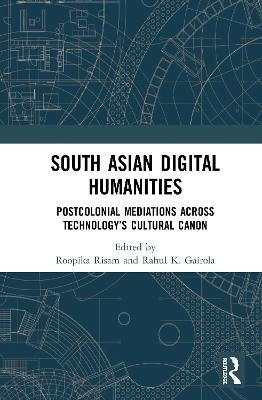
South Asian Digital Humanities
Routledge (Verlag)
978-0-367-50405-2 (ISBN)
The digital cultural record has a powerful role to play in both new and future strategies of creating new homes within the digital milieu. For example, the development and establishment of new digital archives around South Asian studies not only allows us to create new archives of the past but also to remember and commemorate the past differently. New maps transform how we understand space and place. And new digital comfort zones facilitate connections for those whose family and loved ones are only accessible online. Such interventions are essential to the recuperation of the integrity and soul of a people who have lived through and continue to shoulder the fraught and painful legacies of the British Empire and the communal bloodshed wrought by its demise.
Building on the important history of digital humanities scholarship in South Asia and its diasporas that precedes this work, this book contends that South Asian studies is further positioned to offer a new genealogy of digital humanities, demonstrated through this assemblage of essays that reveal how the digital continues to shape notions of home, belonging, nation, identity, memory, and diaspora through a variety of humanistic methodologies and digital techniques.
South Asian Digital Humanities thus demonstrates that postcolonial digital humanities has great possibility for creating some of the most important social justice scholarship in South Asian studies of the past century. It offers these essays as innovative interventions that complicate the digital cultural record while lodging a 'homelanding' for South Asians within it, positioning digital humanities as a method through which South Asian studies can strategically participate in the ongoing struggle for representation within digital knowledge production.
This book was originally published as a special issue of South Asian Review.
Roopika Risam (PhD, Emory University, Atlanta, USA) is an Associate Professor of Secondary and Higher Education and English and the Faculty Fellow for Digital Library Initiatives at Salem State University, USA, where she also serves as Coordinator of the Graduate Certificate in Digital Studies, and Coordinator of the Combined B.A./M.Ed. in English Education. Her research interests lie at the intersections of postcolonial and African diaspora studies, humanities knowledge infrastructures, digital humanities, and new media. Her first monograph, New Digital Worlds: Postcolonial Digital Humanities in Theory, Praxis, and Pedagogy, was published by Northwestern University Press in 2018. She is co-editing two volumes: Intersectionality in Digital Humanities with Barbara Bordalejo for Arc Humanities Press and The Digital Black Atlantic with Kelly Baker Josephs for the Debates in the Digital Humanities series (University of Minnesota Press). Along with Carol Stabile, she is Co-Director of Reanimate, an intersectional feminist publishing collective recovering archival writing by women in media activism. She recently received the Massachusetts Library Association’s Civil Liberties Champion Award for her work promoting equity and justice in the digital cultural record. Rahul K. Gairola (PhD, University of Washington, Seattle, USA) is The Krishna Somers Lecturer in English & Postcolonial Literature in the Creative Media, Arts, & Design discipline and a Fellow of the Asia Research Centre at Murdoch University, Perth, Western Australia. He is the co-author of Migration, Gender and Home Economics in Rural North India (Routledge, 2019); author of Homelandings: Postcolonial Diasporas and Transatlantic Belonging (Rowman & Littlefield International, 2016); and co-editor of Revisiting India’s Partition: New Essays on Memory, Culture, and Politics (Orient Blackswan/Lexington Books, 2016). He is the co-editor of the “Digital Spatialities” special issue of Asiascape: Digital Asia (Brill) and is an Article Editor for Postcolonial Text. He sits on the executive committees of Global Outlook::Digital Humanities (GO::DH), the Australasian Association of Digital Humanities (aaDH), and the Digital Humanities Association for Research and Teaching Innovation (DHARTI, India). He is currently working on a monograph that re-thinks the notion of “home” in technology and sexuality in the South Asian diaspora, and an edited collection on trauma and healing in Asian literature and culture. In addition to teaching in Western Australia, he has taught at the Indian Institute of Technology in Roorkee, India, and a number of American institutions including The City University of New York, the University of Maryland, Baltimore County, and Seattle University.
Preface
Gayatri Chakravorty Spivak
Foreword: From Subaltern Studies to South Asian Digital Humanities
Radhika Gajjala
1. South Asian Digital Humanities Then and Now
Roopika Risam & Rahul K. Gairola
2. Digital Humanities on the Ground: Post-Access Politics and the Second Wave of Digital Humanities
Nishant Shah
3. Emulation as Mimicry: Reading the Salman Rushdie Digital Archive
Porter Olsen
4. Inside and Outside the Literary Marketplace: The Digital Products of Amitav Ghosh, Arundhati Roy, and Salman Rushdie
Tawnya Azar
5. Gender-Based Violence in Contemporary Digital Graphic Narratives From India
Jana Fedtke
6. Acoustic Traces of Poetry in South Asia
A. Sean Pue
7. Beyond the Archive Gap: The Kiplings and the Famines of British Colonial India
Amardeep Singh
8. Colonial Topographies of Internet Infrastructure: The Sedimented and Linked Networks of the Telegraph and Submarine Fiber Optic Internet
Dhanashree Thorat
Afterword: The Vision and the Work into the 21st Century
Sukanta Chaudhuri
| Erscheinungsdatum | 24.07.2020 |
|---|---|
| Verlagsort | London |
| Sprache | englisch |
| Maße | 174 x 246 mm |
| Gewicht | 950 g |
| Themenwelt | Geisteswissenschaften ► Sprach- / Literaturwissenschaft ► Anglistik / Amerikanistik |
| Geisteswissenschaften ► Sprach- / Literaturwissenschaft ► Literaturwissenschaft | |
| Sozialwissenschaften ► Kommunikation / Medien ► Medienwissenschaft | |
| ISBN-10 | 0-367-50405-7 / 0367504057 |
| ISBN-13 | 978-0-367-50405-2 / 9780367504052 |
| Zustand | Neuware |
| Informationen gemäß Produktsicherheitsverordnung (GPSR) | |
| Haben Sie eine Frage zum Produkt? |
aus dem Bereich


